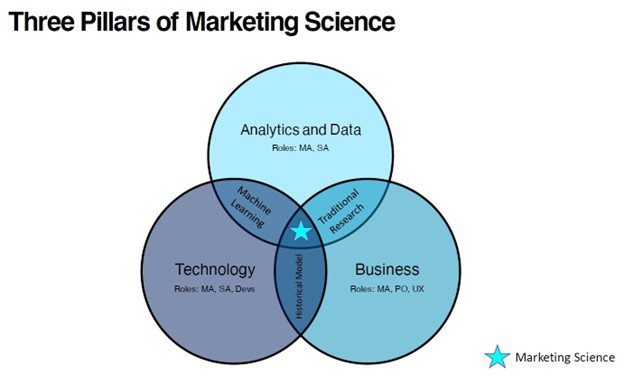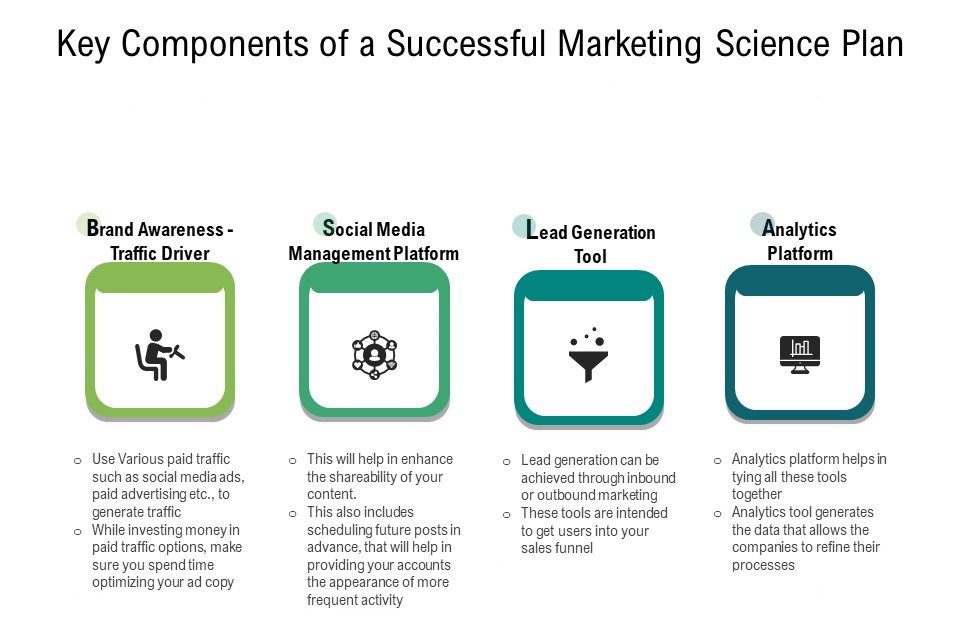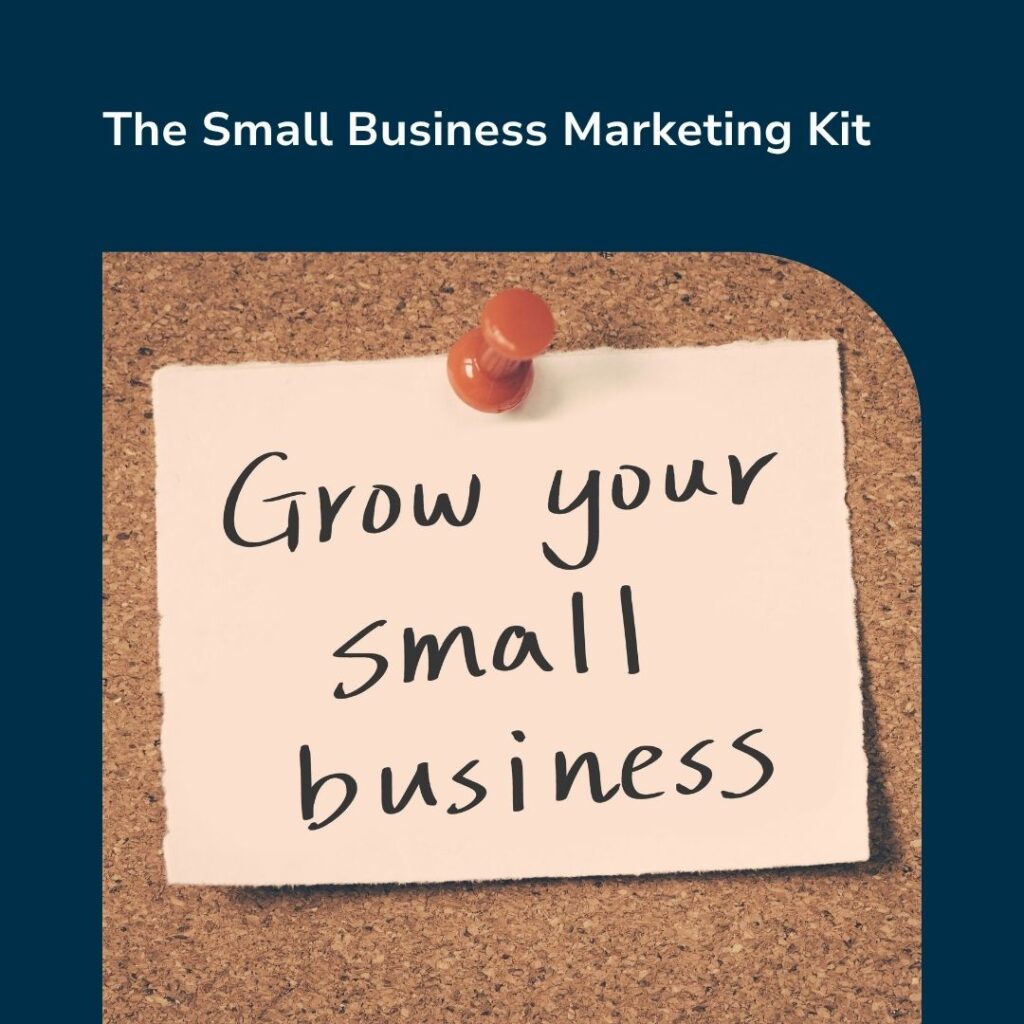In today’s competitive business landscape, marketing science has emerged as a game-changer. It combines data analysis, consumer behaviour research, and advanced technology to unlock valuable insights and drive successful marketing campaigns.
In this blog, we will explore the fascinating world of marketing science and how it can revolutionise your business. Join us as we delve into the key concepts, methodologies, and benefits of adopting a data-driven approach to marketing.
What is Marketing Science?
Marketing science is a field that applies scientific principles and methodologies to understand and solve marketing problems. It combines data analysis, statistical modelling, and experimentation to gain insights into consumer behaviour, market trends, and the effectiveness of marketing strategies.
Marketing science utilises a data-driven approach, leveraging data collection, analytics, and technology to inform marketing decisions and optimise campaigns. By using empirical evidence and quantitative methods, marketing science helps businesses make informed choices, allocate resources effectively, and drive successful marketing outcomes.

Role of Data in Marketing Science
Data plays a crucial role in marketing science, serving as the foundation for understanding consumer behaviour, market dynamics, and campaign effectiveness. By collecting and analysing vast amounts of data, marketers can uncover valuable insights that inform their strategies and decision-making processes.
Data allows marketers to create detailed customer profiles, identify patterns and trends, and predict consumer preferences and behaviours. It provides the empirical evidence needed to test hypotheses, validate assumptions, and measure the impact of marketing initiatives. With the advent of advanced analytics and technologies, marketers can now harness the power of data to drive personalised marketing campaigns, optimise resource allocation, and achieve higher return on investment.
In essence, data is the lifeblood of marketing science, empowering marketers with the knowledge and insights necessary to make informed, data-driven decisions and propel their businesses forward.
Key Components of Marketing Science
There are three main components to marketing science:
Data Collection and Analysis
Data collection involves systematically gathering relevant data from various sources, such as customer information and market research data. Once collected, data is analysed using statistical techniques, segmentation analysis, and other methods to uncover insights and patterns that inform marketing strategies.
Statistical Modelling and Predictive Analytics
Statistical modelling uses mathematical models to identify patterns and relationships within data, enabling marketers to make predictions about consumer behaviour, market trends, and campaign performance. Predictive analytics applies statistical techniques and algorithms to historical data, allowing marketers to anticipate customer response, optimise pricing, and identify growth opportunities.
Experimentation and Testing
Experimentation and testing involve conducting controlled experiments and A/B tests to compare different marketing strategies, messages, or variables. This empirical approach helps marketers validate hypotheses, measure effectiveness, and make data-driven adjustments to optimise campaigns and achieve better results over time.

Benefits of Marketing Science
There are several benefits of making use of marketing science:
Enhanced Customer Understanding
As we are collecting data from customers, we gain insights into their behaviour, preferences, and needs. This helps us create detailed customer profiles, tailor our marketing efforts, and drive higher customer satisfaction and loyalty.
Targeted Marketing Campaigns
By analysing customer data, we can identify segments and develop tailored messaging, optimising our marketing spend and increasing engagement and conversion.
Improved Decision-making
Data-backed insights inform strategic decisions, optimise resource allocation, and maximise ROI.
Enhanced Campaign Optimization
Through testing and analysis, we can identify the most effective strategies, messages, and creative elements, refining campaigns for better performance.
Methodologies in Marketing Science
The major methodologies in marketing science are
A/B Testing
A/B testing is an experimentation method where two or more variations of a marketing element are simultaneously tested with different segments of the target audience. By comparing the performance of these variations, businesses can measure the impact of specific changes, such as different messaging, designs, or offers, and make data-driven decisions to optimise their campaigns and improve conversion rates.
Customer Journey Mapping
Customer journey mapping involves visually representing and understanding the various touchpoints and interactions a customer has with a brand throughout their buying process. By analysing these touchpoints, businesses can identify pain points, optimise the customer experience, and strategically intervene at key stages to drive conversion and customer satisfaction.
Attribution Modelling
Attribution modelling is a method used to assign credit to different marketing touchpoints or channels along the customer journey. It helps businesses understand the impact of each touchpoint on customer conversions, allowing them to optimise their marketing mix and allocate resources effectively to the most influential channels, leading to improved ROI and campaign effectiveness.
How can Businesses make use of Marketing Science: Tips
Here are our best 10 tips for businesses to make use of Marketing science.
Invest in Data Collection and Analysis Capabilities
Businesses should prioritise building robust data collection systems and analytical capabilities to gather and interpret relevant data. This includes implementing tools for customer data tracking, web analytics, and customer relationship management (CRM) systems.
Embrace Technology and Automation
Adopting marketing automation platforms and leveraging advanced technologies such as artificial intelligence and machine learning can streamline data analysis processes, automate repetitive tasks, and generate real-time insights for more efficient decision-making.
Test, Measure, and Optimise
Implement a culture of experimentation and continuous improvement by conducting A/B testing, analysing campaign performance, and making data-driven adjustments. Regularly measure key performance indicators (KPIs) to understand the impact of marketing efforts and optimise strategies based on the insights gained.
Foster Cross-Functional Collaboration
Encourage collaboration between marketing, data analytics, and other relevant departments to ensure a holistic approach to marketing science. By integrating different perspectives and expertise, businesses can uncover new insights, identify opportunities, and develop effective strategies.
Stay Updated with Industry Trends
Marketing science is an ever-evolving field, so it is crucial to stay informed about the latest trends, technologies, and methodologies. Attend industry conferences, participate in training programs, and engage with thought leaders to stay at the forefront of marketing science advancements.
Prioritise Privacy and Data Ethics
Businesses must ensure compliance with data privacy regulations and maintain ethical data practices. Safeguarding customer data, obtaining proper consent, and being transparent about data usage builds trust and protects the business from reputational and legal risks.
Continuously Learn and Adapt
Marketing science is a dynamic discipline, and businesses should foster a culture of learning and adaptation. Encourage curiosity, encourage employees to pursue professional development opportunities, and allocate resources for training and upskilling in data analysis and marketing science methodologies.
By following these tips, businesses can effectively leverage marketing science to gain valuable insights, optimise marketing strategies, and drive meaningful results in today’s data-driven marketing landscape.
Conclusion
In conclusion, marketing science has become an essential tool for businesses in the digital age. By leveraging data, advanced analytics, and technology, businesses can gain deep insights into consumer behaviour, optimise their marketing campaigns, and make informed decisions.
The key components of marketing science, including data collection and analysis, statistical modelling and predictive analytics, experimentation and testing, empower businesses to enhance customer understanding, drive targeted marketing campaigns, improve decision-making, and optimise campaign performance.
By adopting a data-driven approach and embracing the methodologies of marketing science, businesses can unlock the power of data, stay ahead of the competition, and achieve sustainable success in today’s dynamic and competitive marketplace.









